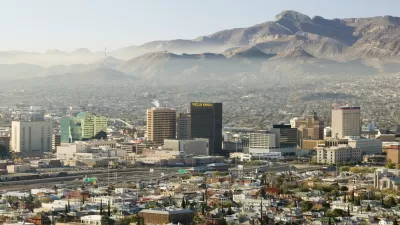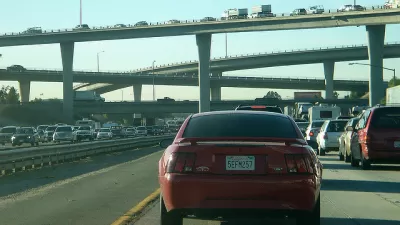A survey of recent planning decisions demonstrates that cities are no longer necessarily looking to more and bigger highways to solve their traffic problems.

An op-ed in The New York Times by Justin Gillis and Hal Harvey posits that two recent events in transportation planning demonstrated that "[b]oth the public and a few of our bolder political leaders are waking up to the reality that we simply cannot keep jamming more cars into our cities."
The first event cited is the L.A. region's decision not to expand the 710 freeway, and the second is a German court’s decision that diesel cars could be banned in city centers, should a city wish to ban them. The article also mentions congestion pricing in London (and discussions of it elsewhere), license-plate lotteries in China, and two highway expansion projects in the United States that did not decrease traffic — as they never do.
"We are revealing no big secrets here," they write, "Urban planners have known all these things for decades."
“But the planners had little clout as their bosses — city and state politicians — cowered before the demands of drivers. What we might be seeing, at last, is a shift in the public mood, a rising awareness that simply building more lanes is not the answer.”
FULL STORY: Cars Are Ruining Our Cities

Study: Maui’s Plan to Convert Vacation Rentals to Long-Term Housing Could Cause Nearly $1 Billion Economic Loss
The plan would reduce visitor accommodation by 25,% resulting in 1,900 jobs lost.

North Texas Transit Leaders Tout Benefits of TOD for Growing Region
At a summit focused on transit-oriented development, policymakers discussed how North Texas’ expanded light rail system can serve as a tool for economic growth.

Using Old Oil and Gas Wells for Green Energy Storage
Penn State researchers have found that repurposing abandoned oil and gas wells for geothermal-assisted compressed-air energy storage can boost efficiency, reduce environmental risks, and support clean energy and job transitions.

Private Donations Propel Early Restoration of Palisades Playground
Los Angeles has secured over $1.3 million in private funding to restore the Pacific Palisades playground months ahead of schedule, creating a modern, accessible space that supports community healing after recent wildfires.

From Blight to Benefit: Early Results From California’s Equitable Cleanup Program
The Equitable Community Revitalization Grant (ECRG) program is reshaping brownfield redevelopment by prioritizing projects in low-income and environmental justice communities, emphasizing equity, transparency, and community benefits.

Planting Relief: Tackling Las Vegas Heat One Tree at a Time
Nevada Plants, a Las Vegas-based nonprofit, is combating the city’s extreme urban heat by giving away trees to residents in underserved neighborhoods, promoting shade, sustainability, and community health.
Urban Design for Planners 1: Software Tools
This six-course series explores essential urban design concepts using open source software and equips planners with the tools they need to participate fully in the urban design process.
Planning for Universal Design
Learn the tools for implementing Universal Design in planning regulations.
Ascent Environmental
Borough of Carlisle
Institute for Housing and Urban Development Studies (IHS)
City of Grandview
Harvard GSD Executive Education
Toledo-Lucas County Plan Commissions
Salt Lake City
NYU Wagner Graduate School of Public Service





























